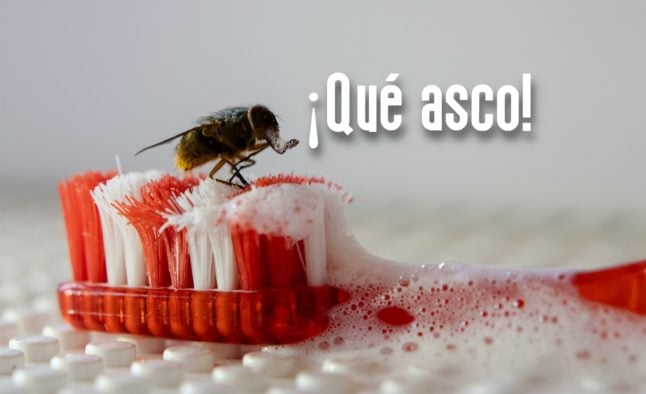Asco is the Spanish word for disgust.
It can refer to the physical feeling of nausea, or to the sense of repulsion at something or someone, physically or morally.
The most common usage of asco you’ll hear in Spain is when someone exclaims ¡Qué asco!, which is like saying ‘yuck!’, ‘gross!’ or ‘disgusting!’ as an interjection.
If something is disgusting, you use the verb dar (to give) and not ser or estar (to be), as in da asco.
To say that something or someone is hecho/a un asco describes it as a mess or dirty.
Again, repulsiveness can be caused by a person’s physical nature or behaviour, so when you want to describe someone as un asco de persona (a disgusting or appalling person) it can be like calling them a pig, or highlighting their moral crookedness.
The person who experiences this sense of disgust will often have a cara de asco, a face or look of disgust.
There are some interesting expressions to do with asco, such as la confianza da asco, which is like saying that familiarity breeds contempt.
There’s also muerto de asco, which although suggests deaths from disgust, really means being bored stiff.
Someone who’s moaning about how bad their life is will also say ¡Qué asco de vida!, ‘What a crummy life!’.
And if you want to tell someone to stop turning their noses up at someone or turning it down, you use the expression no hacerle ascos.
Asco is not a colloquial word but there are the more formal synonyms in Spanish of repugnancia, repulsión, aversión or desagrado.
A less formal synonym on a par with asco is grima, although this implies more the type of disgust that gives one the willies or makes them grimace.
Examples:
Está casa da asco, es una auténtica pocilga.
This house is disgusting, it’s a real pigsty.
Eres una persona muy malvada, me das asco.
You’re a very evil person, you disgust me.
Si te mudas a ese pueblo te vas a morir de asco.
If you move to that village you’re going to be bored stiff.
Tienes el coche hecho un asco, lávalo ya porfavor.
Your car is a mess, clean it now please.
¿Te has sacado un moco? ¡Qué asco!
Did you just pick a bogie out of your nose? Gross!





 Please whitelist us to continue reading.
Please whitelist us to continue reading.
Buenas tardes, did something get lost in translation? I would translate ‘Si te mudas a ese pueblo te vas a morir de asco.’ as ‘If you move to that village you will die of disgust’ not of boredom.
For boredom, I think you would say ‘Si te mudas a ese pueblo te vas a morir de aburrimiento’ or ‘Si te mudas a ese pueblo morirás de aburrimiento’ if using the future tense.
Muy buenas, the expression “morirse de asco” is commonly used to refer to being bored out of one’s mind, even though the “asco” does imply disgust. https://forum.wordreference.com/threads/morirse-de-asco.2774376/
Gracias Alex por la respuesta. ¡Qué Interesante!
Brilliant! Gracias.